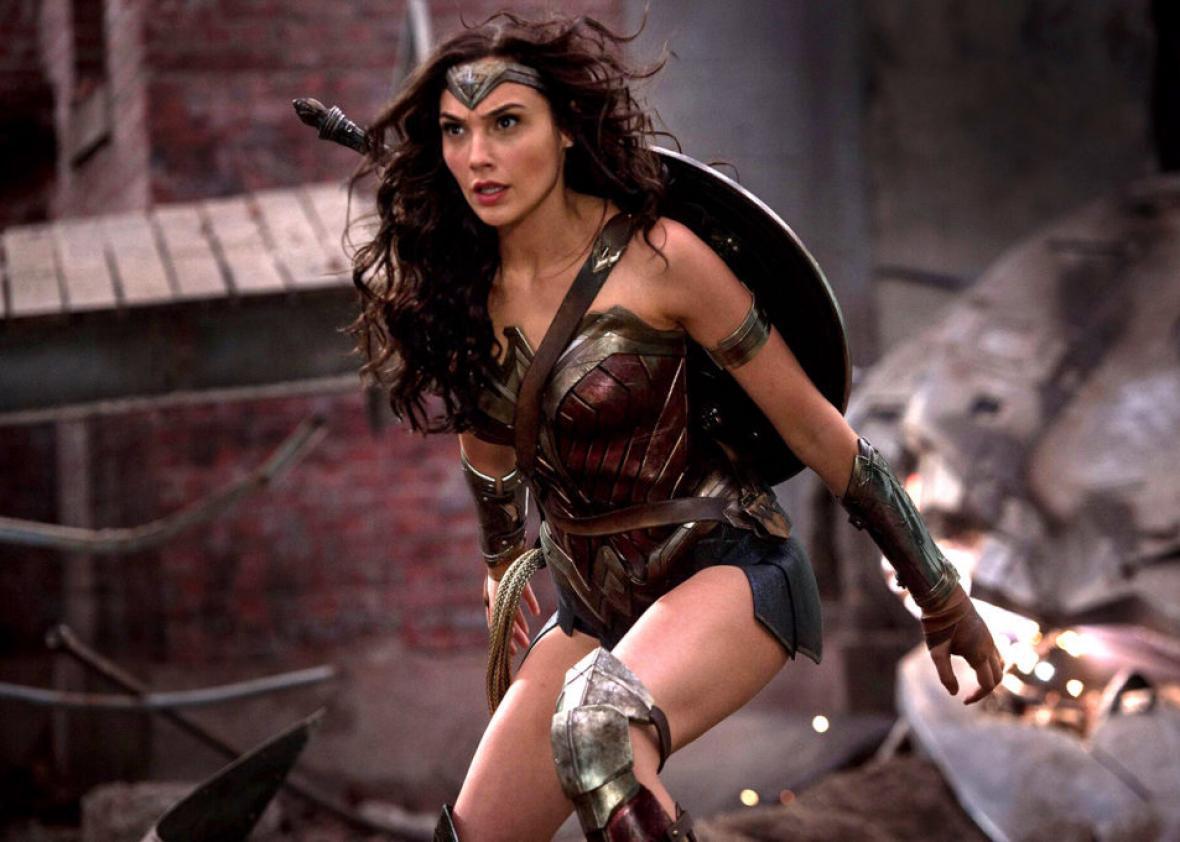While reading my colleagues’ laudatory reviews of Wonder Woman this week, I kept wondering if I’d blacked out during some essential scenes. “Wonder Woman Made Me Finally See the Importance of Female Representation,” Dana Stevens wrote on Thursday. Two of Slate’s male editors compared notes on which parts of the new DC Universe film made them cry. My eyes were not only dry during the movie—half the time, they were rolling out of my head.
To me, whatever chance Wonder Woman had of being some kind of feminist antidote to the overabundance of superhero movies made by and for bros was blown by its prevailing occupation with the titular heroine’s sex appeal. Characters frequently note that Gal Gadot’s Wonder Woman, who goes by Diana in the film, is “the most beautiful woman you’ve ever seen.” Her male companions in the fight against Germany’s WWI forces drool behind her back at the notion that there may somewhere be an island full of women who look like her, with no men in sight. When she walks into a room, even dressed in a plain gray suit and bowler hat instead of her usual sensual armored leotard, men go silent and stare. “I’m both frightened and aroused,” goes one character’s response to Diana’s ass-kicking moves, prompting one of the audience’s loudest, longest laughs at the screening I attended.
“Her femininity is part of the story, for the way it makes even the other heroes in the movie underestimate and discount her. But her gender is never the story’s primary thrust,” wrote a critic at the Verge this week. Disagree. By the time the action got too fast-paced and loud for any more characters to marvel at Diana’s fine bod and bone structure, I was about an hour past being sick of the “sexy lady is also hypercompetent” joke.
One of the Slate colleagues who cried at Wonder Woman’s scenes of female physical strength assured me that Thor, too, featured characters going googly-eyed over Chris Hemsworth’s godlike good looks. I don’t usually watch superhero movies, in part because I can’t tell the white Chrises apart, and in part because I cannot abide the cheesy, thin romance that gets shoehorned into every plot. Wonder Woman is far more enjoyable than most superhero movies I’ve seen, and its love-‘n’-lust narrative, for what it’s worth, is a few centimeters meatier than average. One wonders whether that has anything to do with the fact that a woman is at the center of the story, and prominent women in films almost always end up driving the romantic happenings.
The love story in Wonder Woman also seems positioned as a “no homo” response to the heroine’s inherently queer backstory: Diana was raised on a hidden island that contains only women, some of them fairly jacked and butch-of-center. A few hours after she meets the film’s leading man—Chris Pine as American spy Steve Trevor—Diana lets slip that she’s learned men are integral to reproduction, but “unnecessary” for purposes of pleasure. Truth drop!
And yet. Just a couple of days into their jaunt to stop the Germans from employing new chemical weapons, he’s shutting himself into her hotel room, presumably so they can do sex things. Diana is so clueless about men, human activity, and the basic concepts of manipulation and evil—think mute air-breathing Ariel in The Little Mermaid, if she could incapacitate an entire village of German sharpshooters—that her capacity for consent is somewhat blurry. She can’t even understand why Trevor thinks it would be improper for them to sleep in the same bed when they’ve just met. Diana’s naïveté and innocence are crucial to the film’s moral thrust, but they cast her sexual relationship in a shiftier light.
Perhaps I, a person who writes about gender and feminism every day and hasn’t seen enough superhero stuff to be impressed by the mere existence of a female protagonist, am the wrong audience for this film. Perhaps I was too distracted by the figure-skater dress Diana wears for most of the film, sculpted with tiny bumps for her apparently ever-erect nipples, to applaud the heavy-handed lines (“What I do is not up to you!”) that gesture toward female empowerment. I wondered why I’d come into the movie expecting some energizing woke-feminist manifesto instead of a film that stars one sexy woman surrounded by throngs of horny men, barely passing the Bechdel test after the opening scenes on Diana’s home island. Maybe it’s because, as with the Ghostbusters reboot, insecure men have seized upon Wonder Woman and its all-woman screenings as evidence of a misandrist, matriarchal uprising that threatens their place in the world. Maybe I’d secretly hoped those men were right.
